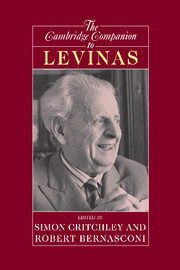Book contents
- Frontmatter
- 1 Introduction
- 2 Levinas and Judaism
- 3 Levinas and the face of the other
- 4 Levinas's critique of Husserl
- 5 Levinas and the Talmud
- 6 Levinas and language
- 7 Levinas, feminism and the feminine
- 8 Sincerity and the end of theodicy
- 9 Language and alterity in the thought of Levinas
- 10 The concepts of art and poetry in Emmanuel Levinas's writings
- 11 What is the question to which 'substitution' is the answer?
- 12 Evil and the temptation of theodicy
- Bibliography
- Index
5 - Levinas and the Talmud
Published online by Cambridge University Press: 28 May 2006
- Frontmatter
- 1 Introduction
- 2 Levinas and Judaism
- 3 Levinas and the face of the other
- 4 Levinas's critique of Husserl
- 5 Levinas and the Talmud
- 6 Levinas and language
- 7 Levinas, feminism and the feminine
- 8 Sincerity and the end of theodicy
- 9 Language and alterity in the thought of Levinas
- 10 The concepts of art and poetry in Emmanuel Levinas's writings
- 11 What is the question to which 'substitution' is the answer?
- 12 Evil and the temptation of theodicy
- Bibliography
- Index
Summary
Quite a few readers of Levinas's work either do not know his Talmudic readings or relegate them to a secondary position. They consider that despite the possible interest the exegetical effort exhibited in them might evoke, these readings remain of no major value for a philosopher. There would be, on the one hand, the philosophical work - the only work worthy of attention - and, on the other, the books consecrated to Judaism. The firmness of this line of demarcation seems none the less highly open to question, if one remembers that Levinas defines Europe by a double loyalty, a loyalty made up of tensions and conflicts between the Bible and the Greeks; the prophets and the philosophers; the good and the true (ti 24). But if borders are also created to be crossed, the one which separates philosophy from the Talmud can be crossed either legally or clandestinely, as in every crossing of a border. But in the present case, who has the authority to decide which is which? Given the question marks attending what is 'proper' to the philosopher and what is 'proper' to the Talmudic scholar, it would seem that this authority does not exist, despite the often violent stands taken by one or the other side to chase the stranger off its territory. The fact that Levinas himself wanted to publish his philosophical writings and his Jewish writings with different publishers should not lead us to think that Jewish sources were foreign to his philosophy or that his questioning of the Hebrew word remained free of all contamination by Greek influences.
- Type
- Chapter
- Information
- The Cambridge Companion to Levinas , pp. 100 - 118Publisher: Cambridge University PressPrint publication year: 2002
- 8
- Cited by



